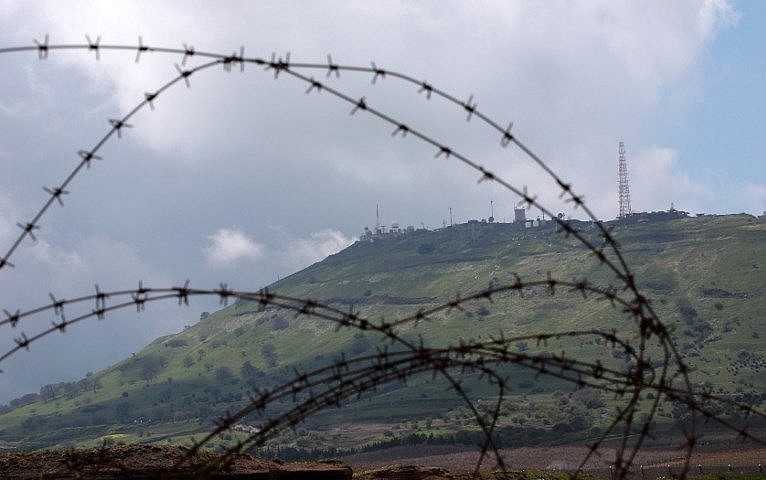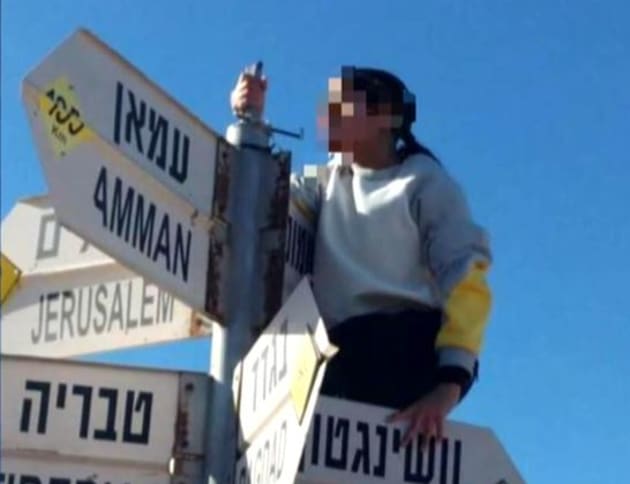Indictment of woman who illegally crossed into Syria last month says interrogators demanded she lead them to Israeli army post but she refused, went to prison for 16 days

After an Israeli woman crossed the border into Syria last month, the Syrians who interrogated her demanded she lead Syrian troops to an Israeli military outpost to capture Israeli soldiers, according to Saturday reports.
The woman refused the demand and was sent to a Damascus prison where she was held for 16 days, said the reports, citing her indictment document.
The woman’s crossing became a major international incident and she was returned to Israel via Russia after over a week of diplomatic wrangling. Her return came at a steep cost and included the release of Syrian captives in Israel, and reportedly involved Israel buying vaccines for Syria.
She was indicted for her actions last month on charges including illegally exiting the country.
The woman, whose identity is barred from publication, has reportedly suffered from mental ill-health in the past. She is reported to be a 25-year-old from Modiin Illit who left the ultra-Orthodox community and speaks Arabic.
The court allowed part of her indictment to be published this week.
Hebrew media reports based on the indictment said the woman had served in the Israeli military in some capacity in 2019. After she finished her service, she adopted a nomadic lifestyle in Israel and did not have a fixed address.
She decided to cross the border into Syria while staying with a family in Jerusalem at the end of January, then researched online which village was closest to the border and a way to get there.
On January 31, she traveled to the Israeli town of Kiryat Shmona, near the border, spent time with a friend there and prepared for her border crossing.

On February 2 she traveled to the Israeli Druze town of Majdal Shams by bus, then set out after dark on foot with food, personal equipment, a phone and a camera. She wanted to stay in Syria for some time, and knew that she would likely be interrogated and could have been killed, the indictment said.
She crossed the border and headed for the Syrian village of Hader under the cover of night to better evade Israel Defense Forces surveillance of the area.
She walked for nearly a day, left her bag in the demilitarized zone between Syria and Israel, and entered the village with only her camera around 7 p.m. A crowd gathered around her as she reached the village, and two people took her to a nearby police state, according to the indictment.
She was taken to a detention center, interrogated, and the next day taken to a prison in Damascus.
She was interrogated for several days in total. She told her interrogators how she had crossed the border and described in a notebook they provided details of the route.
The interrogators asked her to return to the route and lead Syrian soldiers to an Israeli outpost so they could carry out an attack, but she refused, saying she was not interested in killing. The Syrians said they would not kill anyone, but aimed to capture Israeli soldiers, and she again refused, the indictment said.
The woman was transferred to Russian custody on February 19.
The prosecution said that the Syria incident was not her first time illegally crossing Israel’s borders. She went into Palestinian Authority areas several times, knowing it was not allowed.
In November, she attempted to get into Gaza but was stopped at the fence near Kibbutz Nahal Oz.
She then decided to try to cross into Gaza by sea, and four days later, in the evening, went into the water at Zikim Beach on a surfboard. She was apprehended at sea by the IDF and turned back.
In January, she illegally bicycled across the Jordanian border near Eilat, where she met Jordanian soldiers, had coffee with them and spent several hours with them. She was questioned in Aqaba by Jordanian intelligence, then returned to Israel.

In October 2020, she took a Jeep to the Lebanon border and spoke with people on the other side of the security fence. She was spotted by the Hezbollah terror group and had her picture published in local media.
Her defense has argued that she has not harmed Israeli security and had no intention of doing so.
The woman was returned to Israel from Moscow on February 19, in a deal brokered by Russia. As part of the deal, Israel reportedly financed the purchase of $1.2 million worth of Russian-made COVID-19 vaccines for Syrian use.
Israel released two Syrian shepherds captured on the Israeli side of the border at the same time, and reduced the sentence of a security prisoner of Syrian nationality, in what was widely seen as an exchange deal. Israel said it made the moves as a goodwill gesture.
After the woman was returned, she reportedly told Israeli investigators that she had been “seeking adventure.” According to Channel 12, she did not apologize or express regret for the trip. Investigators determined that she did not cooperate with any enemy entities while in Syria.
Reports stressed that she was questioned gently by the interrogators and is believed to be troubled.
Her Facebook page shows her traveling often inside Israel, including in several Arab areas, and in the West Bank. In one post, she wrote, “I don’t recognize your lines, either green or blue or purple, and not even a red line will stop me.” Israel’s borders with the West Bank, Lebanon and Syria are referred to as the Green, Blue and Purple lines.
As reported by The Times of Israel
